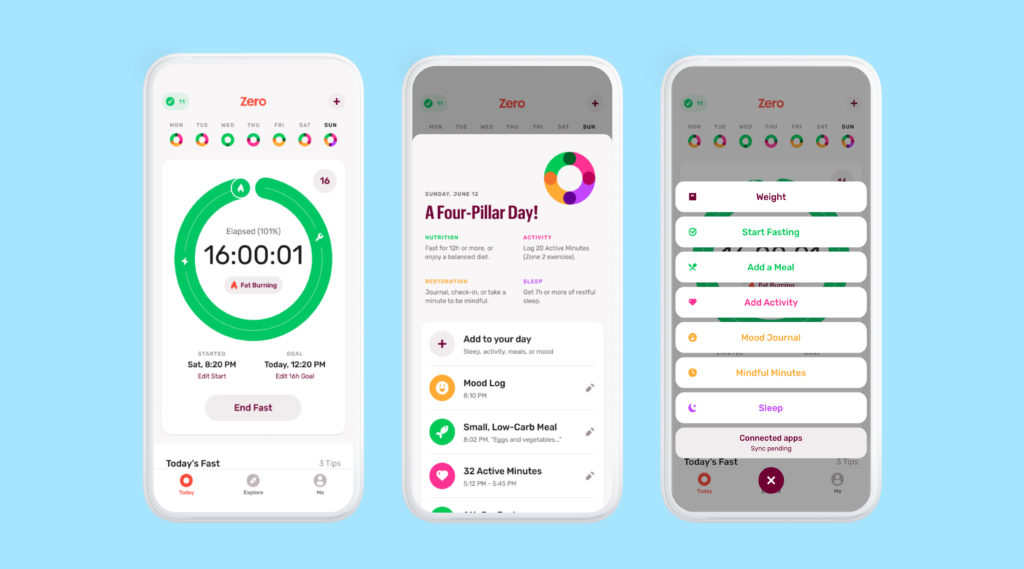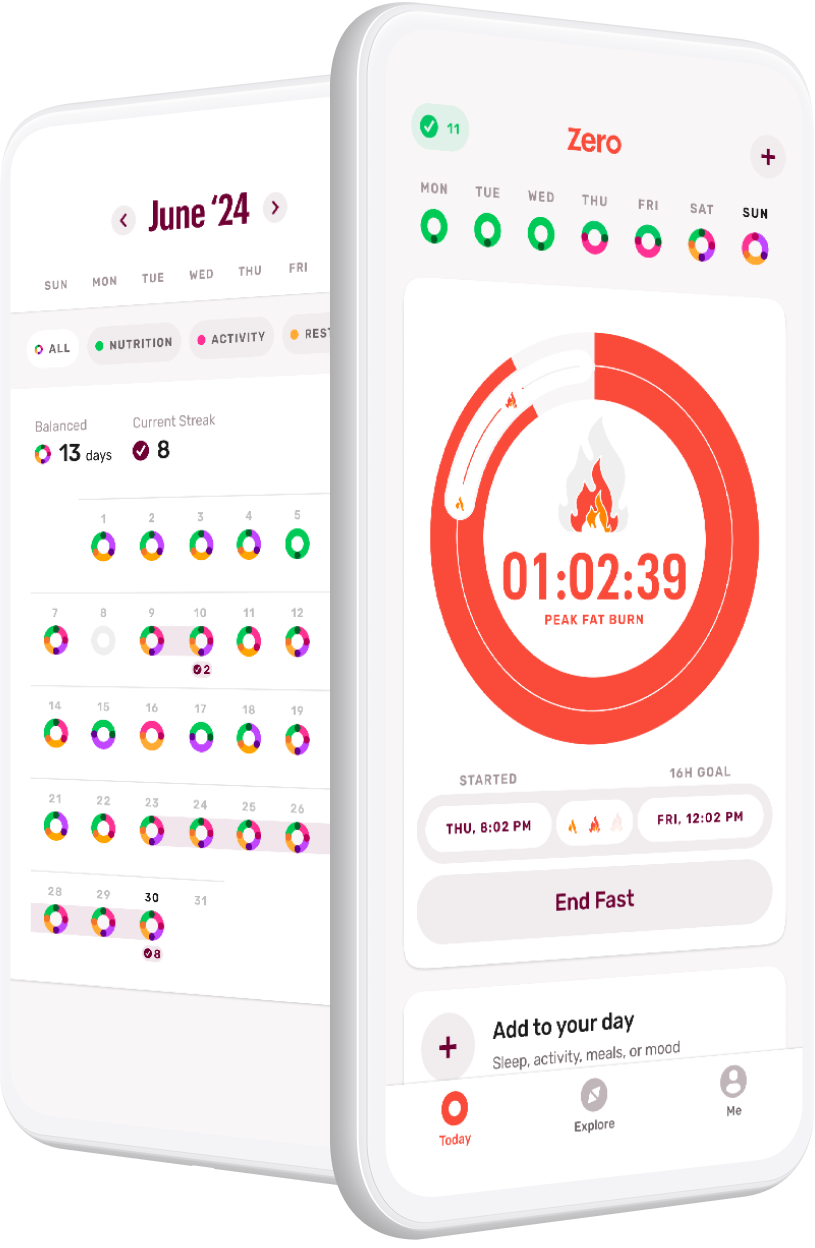Written and medically reviewed by Katya Meyers, RD
It might sound basic, but sleeping is one of the best things you can do for your well-being. Sleep can prevent disease, improve mental health, and even boost physical performance. In fact, Sleep is so vital to so many health metrics that it’s one of the Four Pillars of Health — along with Nutrition, Activity, and Restoration.
Of course, just because sleep is important doesn’t mean it’s easy. Between busy lifestyles and racing minds, catching your nightly Zs can often feel like quite the undertaking. Fortunately, Zero helps you stay on track so you can reap the full benefits that come with being well-rested.
Keep reading to discover the importance of the Sleep Pillar, get practical tips for building healthy Sleep habits, and see how Zero can guide you along the way.
How Sleep Supports Your Health Goals
Try going even a single night without it, and you’ll soon realize that getting sufficient, high-quality sleep is a must. As you sleep, your body performs a host of activities that support growth and recovery, from repairing damaged cells to activating your immune system and stabilizing your blood sugar levels.
So what is quality sleep, and how much is enough? According to the research, 7–9 hours of uninterrupted sleep is optimal for the average, healthy adult. In fact, people who sleep at least 7 hours a night have been shown to be better at maintaining their weight and are less likely to be overweight or obese. So, if your health goals include weight management or weight loss, prioritizing Sleep is crucial.
How to Start Building Healthy Sleep Habits
When it comes to Sleep, preparation is key. Set yourself up for success by forming healthy habits that are conducive to a good night’s rest.
Here are a few suggestions:
- Take naps earlier in the day. Naps that are too close to bedtime can make it harder to fall asleep and double your wake time at night.
- Prioritize activity during daylight hours. Getting your daily dose of movement in while the sun is still out helps your body align with its natural circadian rhythm.
- Avoid alcohol before bed. Alcohol can wreak havoc on your sleep architecture by decreasing REM sleep while increasing insomnia as well as daytime sleepiness.
- Keep your bedroom cool and dark. A drop in core body temperature before bed promotes coordinated hormonal shifts, which help improve sleep quality.
- Be consistent. Research demonstrates that establishing a routine (i.e., getting up and going to bed at roughly the same time) is correlated with higher sleep satisfaction scores and better mental health.
How Zero Helps You Sleep Better
The best part about embarking on a Sleep journey with Zero is that you’re not alone. In addition to a wealth of articles and videos, Zero has three important features that will help you assess your big-picture progress. Let’s get to know them!

The Loop
Visualize your journey and celebrate your wins across days, weeks, months, and years. When you log at least 7 hours of sleep, you’ll see the Loop fill up with Sleep’s corresponding color, purple. To fill in all four colors and close the Loop for the day, you’ll need to complete the other Pillars of Health — more on them later.
The Habit Tracker
Build actionable, data-driven Sleep habits with the Habit Tracker. Simply tap on the “+” icon in the upper right corner of the Today tab, and watch your smart choices tell a compelling story of progress over time. If you’re using your Apple Watch, Fitbit, Oura, or other apps or wearables, you can sync them with Zero to make this a completely automated experience.
The Fasting Timer
Sleep and fasting go hand in hand. Starting your fast 2–4 hours before bedtime optimizes your fat metabolism and ensures no digestion-related conflicts happen while you’re trying to sleep. With Zero’s Fasting Timer, you can track your fasts, receive custom Fasting Tips based on your unique metrics, and access Personalized Fasting Zones, which detail your body’s inner workings throughout a fast.
Pairing Sleep with the Other Pillars of Health
When you integrate healthy Sleep habits into your daily life, you’ll also eat better, move better, and restore better. By linking these healthy habits, you’ll experience lasting, transformative changes to your well-being.
Sleep + Healthy Nutrition

To track your healthy Nutrition habits, tap the “+” icon in the upper right corner of the Today tab.
What and when you eat and drink can dramatically impact your sleep. As the day winds down, your body has a harder time handling larger meals, especially those containing processed carbohydrates and sugars. Research suggests that, even in healthy people, eating after sunset may have negative effects on sleep, especially for women. So, if you find yourself eating within 2 hours of your intended bedtime, emphasize whole foods and avoid processed carbohydrates that are likely to spike your glucose and disrupt your sleep.
Tip: Try to eat smaller meals and emphasize minimally-processed whole foods in the evening hours so you can fall asleep faster and stay asleep longer.
Sleep + Healthy Activity

To track your healthy Activity habits, tap the “+” icon in the upper right corner of the Today tab. Using Apple Watch or another app or wearable? Connect Zero with Apple Health and we’ll automatically sync your daily progress.
Well-corroborated research shows that exercise of nearly any sort can enhance sleep quantity and quality. While no one type of exercise has been identified as being more beneficial than another, we do know that regular (i.e., consistent) physical activity is better at improving your sleep than acute (i.e., occasional) physical activity. In other words, pick a form of exercise that you enjoy and stick with it.
Tip: Get lots of movement — structured and unstructured — on most days for restful sleep.
Sleep + Healthy Restoration

To track your healthy Restoration habits, tap the “+” icon in the upper right corner of the Today tab.
We all know that a night of good sleep can feel highly rejuvenating. In a reciprocal way, many activities that are restorative — like foam rolling, stretching, or yoga — can provide the perfect segue to sleep. These activities increase blood flow and reduce muscle tension, both of which invite deeper sleep. Meditation has also been shown to improve sleep quality, particularly for those suffering from insomnia or other sleep disturbances.
Tip: Bedtime routines aren’t just for kids! Following a dedicated sleep routine can alleviate stress and lead to better sleep.
Conclusion
Maintaining good sleep hygiene and focusing on both the quantity and quality of your sleep is foundational to all aspects of your health and longevity. And while Sleep is powerful on its own, compounding it with the Nutrition, Activity, and Restoration Pillars will put you on the right path towards living better, longer.
- The Fasting Guide to Menopause, Perimenopause, and Postmenopause - April 8, 2024
- Try This Instead of That: How to Bookend Your Fasts - March 25, 2024
- 60 Names for Sugar: The Myths, The Facts, and What You Should Know - February 12, 2024

